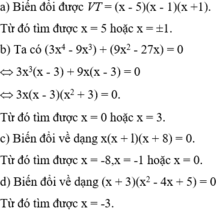Hãy nhập câu hỏi của bạn vào đây, nếu là tài khoản VIP, bạn sẽ được ưu tiên trả lời.

2:
a: =>(x-9)(x-1)=0
=>x=9 hoặc x=1
b: =>(x+4)(x^2-4x+16)+(x+4)(x-16)=0
=>(x+4)(x^2-4x+16+x-16)=0
=>(x+4)(x^2-3x)=0
=>x(x-3)(x+4)=0
=>x=0;x=3;x=-4
bài 2 :
a: =>(x-9)(x-1)=0
=>x=9 hoặc x=1
b: =>(x+4)(x^2-4x+16)+(x+4)(x-16)=0
=>(x+4)(x^2-4x+16+x-16)=0
=>(x+4)(x^2-3x)=0
=>x(x-3)(x+4)=0
=>x=0;x=3;x=-4
![]()

a ĐKXĐ: x<>0; x<>3
b: Sửa đề; x^2-6x+9/x^2-3x
\(A=\dfrac{\left(x-3\right)^2}{x\left(x-3\right)}=\dfrac{x-3}{x}\)
c: Khi x=5 thì \(A=\dfrac{5-3}{5}=\dfrac{2}{5}\)

Hướng dẫn giải:
Điều kiện xác định của phân thức: x ≠ 1
Ta có 
Để N nguyên  nguyên ⇒ x - 1 là ước của 2
nguyên ⇒ x - 1 là ước của 2
Ư ( 2 ) = 1 ; - 1 ; 2 ; - 2
x – 1 = 1 ⇒ x =2 (thỏa mãn điều kiện xác định);
x - 1 = -1 ⇒ x = 0 (thỏa mãn điều kiện xác định);
x - 1 = 2 ⇒ x = 3 (thỏa mãn điều kiện xác định);
x - 1 = -2 ⇒ x = -1 (thỏa mãn điều kiện xác định);
Vậy với x ∈ { -1;0;2;3 } thì phân thức N nhận giá trị nguyên

a) \(\left(x-5\right)^2=\left(3+2x\right)^2\)
\(\Rightarrow\left(3+2x\right)^2-\left(x-5\right)^2=0\)
\(\Rightarrow\left(3+2x+x-5\right)\left(3+2x-x+5\right)=0\)
\(\Rightarrow\left(3x-2\right)\left(x+8\right)=0\)
\(\Rightarrow\left[{}\begin{matrix}3x-2=0\\x+8=0\end{matrix}\right.\) \(\Rightarrow\left[{}\begin{matrix}x=\dfrac{2}{3}\\x=-8\end{matrix}\right.\)
b) \(27x^3-54x^2+36x=9\)
\(\Rightarrow27x^3-54x^2+36x-9=0\)
\(\Rightarrow27x^3-54x^2+36x-8+8-9=0\)
\(\Rightarrow\left(3x-2\right)^3-1=0\)
\(\Rightarrow\left(3x-2-1\right)\left[\left(3x-2\right)^2+3x-2+1\right]=0\)
\(\Rightarrow\left(3x-3\right)\left[\left(3x-2\right)^2+3x-2+\dfrac{1}{4}-\dfrac{1}{4}+1\right]=0\)
\(\Rightarrow\left(3x-3\right)\left[\left(3x-2+\dfrac{1}{2}\right)^2+\dfrac{3}{4}\right]=0\)
\(\Rightarrow\left(3x-3\right)\left[\left(3x-\dfrac{3}{2}\right)^2+\dfrac{3}{4}\right]=0\left(1\right)\)
mà \(\left(3x-\dfrac{3}{2}\right)^2+\dfrac{3}{4}>0,\forall x\)
\(\left(1\right)\Rightarrow3x-3=0\Rightarrow3x=3\Rightarrow x=1\)
(\(x-5\))2 = (3 +2\(x\))2 ⇒ \(\left[{}\begin{matrix}x-5=3+2x\\x-5=-3-2x\end{matrix}\right.\) ⇒ \(\left[{}\begin{matrix}x=-8\\x=\dfrac{2}{3}\end{matrix}\right.\) vậy \(x\in\){-8; \(\dfrac{2}{3}\)}
27\(x^3\) - 54\(x^2\) + 36\(x\) = 9
27\(x^3\) - 54\(x^2\) + 36\(x\) - 8 = 1
(3\(x\) - 2)3 = 1 ⇒ 3\(x\) - 2 = 1 ⇒ \(x\) = 1

a: ĐKXĐ: \(x\notin\left\{-3;2\right\}\)
b: \(A=\dfrac{x^2-4-5+x+3}{\left(x-2\right)\left(x+3\right)}=\dfrac{x^2+x-6}{\left(x-2\right)\left(x+3\right)}=\dfrac{x+2}{x-2}\)
c: Để A=3/4 thì 4x-8=3x+6
=>x=14
d: Để A nguyên thì \(x-2\in\left\{1;-1;2;-2;4;-4\right\}\)
hay \(x\in\left\{3;1;4;0;6;-2\right\}\)

chắc đề cho x,y chứ x+y=6,x-y=4,xy=5
(làm ra bạn tự thay số vào tính)
a,\(=>A=\left(x+y\right)^2-2xy=.....\)
b,\(=>B=\left(x+y\right)^3-3xy\left(x+y\right)+xy=....\)
c,\(=>C=\left(x-y\right)\left(x+y\right)=....\)
d,\(=>D=\dfrac{x+y}{xy}=.....\)
e,\(=>E=\dfrac{x^2+y^2}{xy}=\dfrac{\left(x+y\right)^2-2xy}{xy}=...\)

$x(x^2-3)=9+x^3\\\Leftrightarrow x^3-3x=9+x^3\\\Leftrightarrow x^3-3x-x^3=9\\\Leftrightarrow -3x=9\\\Leftrightarrow x=-3$
Vậy giá trị của $x$ cần tìm là $x=-3$
\(x\cdot\left(x^2-3\right)=9+x^3\)
\(\Leftrightarrow x^3-3x=9+x^3\)
\(\Leftrightarrow x^3-x^3=9+3x\)
\(\Leftrightarrow9+3x=0\)
\(\Leftrightarrow3x=-9\)
\(\Leftrightarrow x=-3\)